2019年八年级英语上册语法词语运用讲义(新版)人教新目标版
(完整版)2019年初中英语词汇运用和语法填空及短语归纳总结,推荐文档
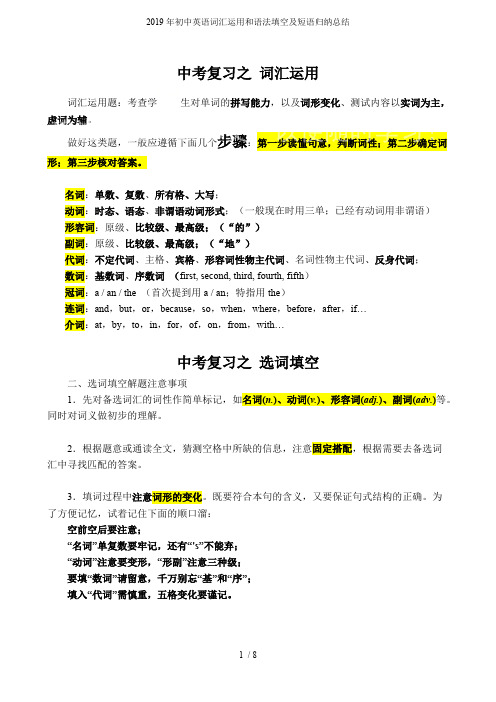
中考复习之词汇运用词汇运用题:考查学生对单词的拼写能力,以及词形变化、测试内容以实词为主,虚词为辅。
做好这类题,一般应遵循下面几个步骤:第一步读懂句意,判断词性;第二步确定词形;第三步核对答案。
名词:单数、复数、所有格、大写;动词:时态、语态、非谓语动词形式;(一般现在时用三单;已经有动词用非谓语)形容词:原级、比较级、最高级;(“的”)副词:原级、比较级、最高级;(“地”)代词:不定代词、主格、宾格、形容词性物主代词、名词性物主代词、反身代词;数词:基数词、序数词(first, second, third, fourth, fifth)冠词:a / an / the (首次提到用a / an;特指用the)连词:and,but,or,because,so,when,where,before,after,if…介词:at,by,to,in,for,of,on,from,with…中考复习之选词填空二、选词填空解题注意事项1.先对备选词汇的词性作简单标记,如名词(n.)、动词(v.)、形容词(adj.)、副词(adv.)等。
同时对词义做初步的理解。
2.根据题意或通读全文,猜测空格中所缺的信息,注意固定搭配,根据需要去备选词汇中寻找匹配的答案。
3.填词过程中注意词形的变化。
既要符合本句的含义,又要保证句式结构的正确。
为了方便记忆,试着记住下面的顺口溜:空前空后要注意;“名词”单复数要牢记,还有“'s”不能弃;“动词”注意要变形,“形副”注意三种级;要填“数词”请留意,千万别忘“基”和“序”;填入“代词”需慎重,五格变化要谨记。
4.完成填词后,应通读全文,复核校对。
检查单词拼写是否正确,是否有时态、语态、习惯用法及词语选用上的错误,以确保答案的正确性。
最后填答案时,切勿错位。
中考复习之语法填空步骤:1.快速浏览,了解大意。
对于简单有把握的空,可以先填出来;2.上下查看,填出答案。
根据上下文及空格前后的逻辑关系,填出正确的词以及正确的形式;3.通读全文,检查确认。
2019年八年级英语上册语法阅读理解讲义(新版)人教新目标版
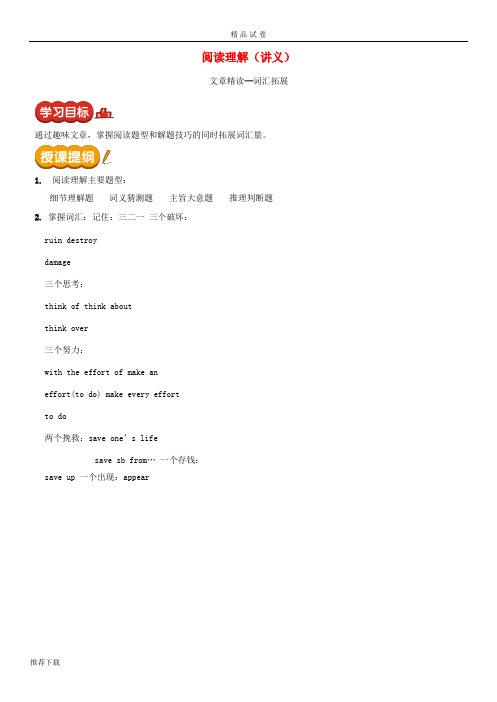
精品试卷阅读理解(讲义)文章精读—词汇拓展通过趣味文章,掌握阅读题型和解题技巧的同时拓展词汇量。
1. 阅读理解主要题型:细节理解题词义猜测题主旨大意题推理判断题2. 掌握词汇:记住:三二一三个破坏:ruin destroydamage三个思考:think of think aboutthink over三个努力:with the effort of make aneffort(to do) make every effortto do两个挽救:save one’s lifesave sb fr om… 一个存钱:save up 一个出现:appearIn the year 3131, the goats live in the Qingqing Grasslands happily, while “Grey Wolf” and his wife “Red Wolf” move to Qingqing Grasslands to try and catch them.But goats in this time are very clever and powered with technology. Every time Grey Wolf appears at the School of Goats, he thinks of a secret plan to catch the goats. Among the goat students, a smart young boy goat named “Pleasan t” always finds a way to ruin Grey Wolf’splans and save the goats. With the effort of Pleasant and his friends,Grey Wolf never catches any goats.The underlined word “r ui n” in the second paragraph probably means.A. to breakB. to run away fromC. to changeD. to steal阅读理解主旨大意题和推理判断题技巧攻略掌握阅读理解技巧,重点掌握主旨大意题和推理判断题的解题技巧。
人教版八年级上册单词语法
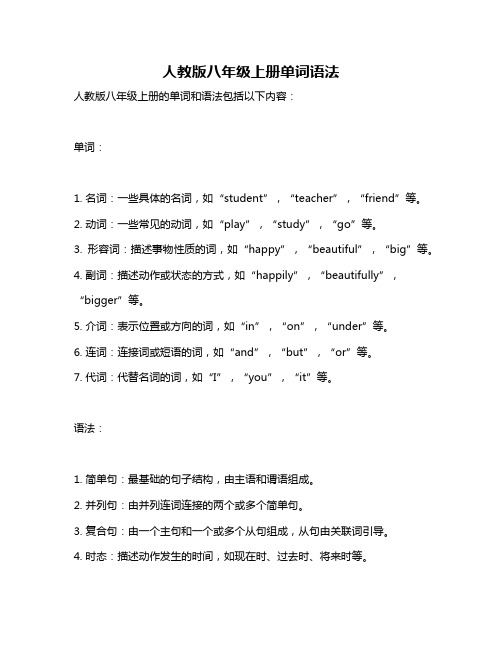
人教版八年级上册单词语法人教版八年级上册的单词和语法包括以下内容:单词:1. 名词:一些具体的名词,如“student”,“teacher”,“friend”等。
2. 动词:一些常见的动词,如“play”,“study”,“go”等。
3. 形容词:描述事物性质的词,如“happy”,“beautiful”,“big”等。
4. 副词:描述动作或状态的方式,如“happily”,“beautifully”,“bigger”等。
5. 介词:表示位置或方向的词,如“in”,“on”,“under”等。
6. 连词:连接词或短语的词,如“and”,“but”,“or”等。
7. 代词:代替名词的词,如“I”,“you”,“it”等。
语法:1. 简单句:最基础的句子结构,由主语和谓语组成。
2. 并列句:由并列连词连接的两个或多个简单句。
3. 复合句:由一个主句和一个或多个从句组成,从句由关联词引导。
4. 时态:描述动作发生的时间,如现在时、过去时、将来时等。
5. 语态:描述动作的状态,如主动语态和被动语态。
6. 虚拟语气:用于表示假设或与事实相反的情况。
7. 非谓语动词:动词的其他形式,如不定式、动名词和分词。
8. 形容词和副词的比较级和最高级:描述事物之间的比较关系。
9. 定冠词和不定冠词:表示特指和泛指的冠词。
10. 数词:表示数量和顺序的数字。
11. 介词短语:由介词和其后的名词或代词组成的短语。
12. 主谓一致:描述主语和谓语在人称和数上的一致性。
以上是人教版八年级上册英语课程中的主要单词和语法点,供您参考,具体内容建议查阅教材或教辅书。
人教版八年级英语上册语法单词讲义
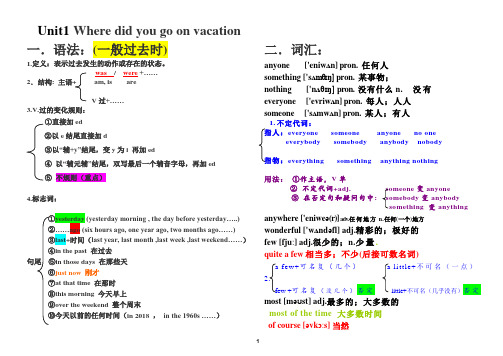
Unit1 Where did you go on vacation 一.语法:(一般过去时)1.定义:表示过去发生的动作或存在的状态。
was / were +…… 2.结构: 主语+ am, is areV 过+…… 3.V.过的变化规则: ①直接加ed②以e 结尾直接加d③以“辅+y”结尾,变y 为i 再加ed④ 以“辅元辅”结尾,双写最后一个辅音字母,再加ed ⑤ 不规则(重点)4.标志词:①yesterday (yesterday morning , the day before yesterday…..) ②……ago (six hours ago, one year ago, two months ago……) ③last+时间(last year, last month ,last week ,last weekend……) ④in the past 在过去 句尾 ⑤in those days 在那些天⑥just now 刚才⑦at that time 在那时 ⑧this morning 今天早上 ⑨over the weekend 整个周末⑩今天以前的任何时间(in 2018 , in the 1960s ……)二.词汇:anyone ['eniw ʌn] pron. 任何人 something ['s ʌm θɪŋ] pron. 某事物;nothing ['n ʌθɪŋ] pron. 没有什么n. 没有 everyone ['evriw ʌn] pron. 每人;人人 someone ['s ʌm w ʌn] pron. 某人;有人1. 不定代词:指人:everyone someone anyone no one everybody somebody anybody nobody指物:everything something anything nothing用法: ①作主语,V 单② 不定代词+adj. someone 变anyone③ 在否定句和疑问句中: somebody 变anybodysomething 变anythinganywhere ['eniwe ə(r)] adv.任何地方n.任何(一个)地方dislike doing sth.(不喜欢干某事)have a good time=enjoy oneself=have fun玩得痛快Central Park 中央公园Tian'anmen square 天安门广场the Palace Museum 故宫博物院Unit2 How often do you exercise?一.语法:(频度副词和次数的表达)(一).频度副词always > usually > often>sometimes > seldom > hardly ever > nevershare [ʃe ə(r)] vt.分享,共享;分配;共有14. share sth. with sb. 和某人分享某物share in sth. 共同分担某事similar ['s ɪm əl ə(r)] adj. 类似的 be similar to 类似于;与...相似primary ['pra ɪm əri] adj.最初的,最早的information [ˌɪnf ə'me ɪʃn] n.信息;情报;资料;通知16. information 不可名Unit4 What's the best movie theater? 一. 语法:(adj.&adv.最高级)1.定义:表示三者或以上同类事物之间的比较 ①主+谓+the+最高级+范围②主+谓+比+than+any other+名单+范围 2.结构 ③One of +the +形高名复 is……④ the +序数词+形高名单 is ……⑤主+谓+the +最高级+名词+I have ever ……theater ['θɪətə] n.剧场;电影院;戏院comfortable ['kʌmftəbl] adj.舒适的;充裕的comfortably ['kʌmftəbli] a d v.舒服地;容易地;充裕地seat [siːt] n.座位;1.have a seat =sit down 坐下sit v.坐(sat)screen [skriːn] n.屏幕;银幕close [kləs]v.关;合拢;不开放;停业2.be close to …… 离……近close v.关☞→ open v. 打开ticket n.票worse [wɜːs] adj.更坏的;更差的worst [wɜːst] adj.最坏的;最差的cheaply ['tʃiːpli] adv.廉价地;粗俗地3. cheap adj.便宜的☞→ expensive/dear adj.昂贵的song [sɒŋ] n.歌曲;歌唱choose [tʃuːz]v.选择;决定5.choose-chose-chosencarefully ['keəfəli] adv.小心地,认真地6.careful adj. ☞→ carefully adv.careless adj. ☞→ carelessly adv. 粗心地reporter [rɪ'pɔːtə(r)] n.记者so far到目前为止;迄今为止fresh [freʃ] adj.新鲜的;清新的service ['sɜːvɪs] n.服务1.paper n.纸不可名(a piece of paper 一张纸)paper n. 试卷可名pollute[pə'luːt] v.污染pollution [pə'luːʃn] n. 污染;污染物prediction[prɪ'dɪkʃn] n.预测future ['fjuːtʃər]n. 未来2. in the futu re 在将来;在未来in future 今后;以后environment [ɪn'vaɪrənmənt] n.环境3.protect th e envi ron men t 保护环境planet ['plænɪt] 行星earth[ɜːrθ] n.地球;泥土3.on the earth 在地球上save the earth 拯救地球世界上独一无二的事物前必须用the如:the sun the world the moon 等plant [plænt] v.种植,n. 植物part [pɑːrt] v.参加,部分play a park 参与(某事)5. play a park in doing sth. 参与做某事peace [piːs] n.和平☞ peaceful adj. 和平的sea [si] n. 海;海洋;许多;大量4.at sea 在海上by sea 坐船in the sea 在海里sky[skaɪ] 天空astronaut['æstrənɔːt]宇航员word[wɜːrd] n.单词;probably ['prɑːbəbli] adv.大概;或许;很可能during['dʊrɪŋ] prep. 在…的时候,在…的期间holiday ['hɑːlədeɪ] n.假日17. holiday 休假(指法定节假日)vacation 假期(工作或学习中一段很长时间的休息)Unit 9 Can you come to my party?you 'll have a great time!语法:if引导的条件状语从句三.解析宾语从句1.定义:充当宾语成分的句子叫宾语从句2.时态:①主现从任①主过从过①从真永现①陈述句用that(可省略)3.引导词①一般疑问句用if/whether①特殊疑问句用特殊疑问词四.解析定语从句(定从的引导词没有what)考点:先行词和引导词的关系人who /that名词which/that地点where时间when二.词汇:meeting['mitɪŋ] n. 会议;会见;集会;汇合点v.会面;会合4.be angry with sb.生某人的气be angry at/about sth.understanding [ˌʌndər'st æ ndɪŋ] adj.善解人意的,体谅人的5.derstand v. 理解弄清楚(understood)mistake[mɪ'steɪk] n. 错误,失误6make mistakes 犯错误make a mistake in sth. 在某方面犯错误himself [hɪm'sɛlf] pron. 他自己;他亲自,他本人careful['kerfl] 小心的,细致的careless ['kerləs] adj. 粗心的,不小心的solve [sɑːlv]解决;解答7. solve the problem 解决问题step [stɛp] n. 步,脚步;步骤;v。
2019秋人教新目标八年级英语上册作业课件:Unit 1 第三课时 Section A Gramma
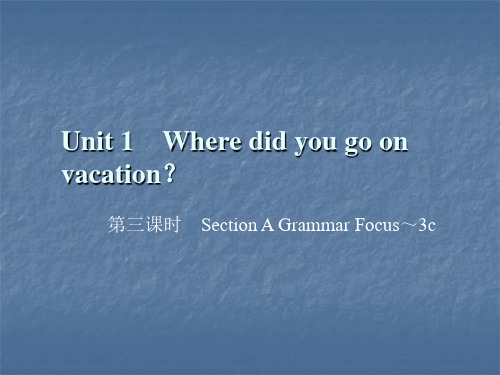
—Of cournsoet.hHinerge’s some bread.
18.ELvisetreyno!ne
is singing in the next room.
四、按要求完成句子,每空一词。
21.I went somewhere interesting last summer.(改为否
定句di)dn’t
The movie was so boring that almost everyone felt bored. 那部电影太没意思了以至于几乎每个人都感到无聊。
一、根据句意用was,were,did,didn’t填空。
1.— Were morning?was
you in the classroom yesterday
after she saw the question.
41.——你去书店了吗?——当然了。我买了一本新
书。
Of course
—Did you go to the bookstore?—
.I
bought a new book.
anything
good
42.我认为新规章将对我们没有任何好处。
—Yes,waIs
.
2.She Did
a nurse from 2010 to 2017.
3.—
didn’t they go to Japan last year?
—No,they
.
were
4.—When
was
you born in Wuhan?
—I
was
born in 2004.
5.I
a primary(小学的) student two years
人教新目标2019年中考英语总复习 教材知识点汇总八上Units5_6精品课件

be able to有人称和数的变化;而can没有人称和数的变 化
can除表示“能力”外,还可以表示请求、许可或猜 用法 测;而be able to则不可以
同 表示“能力”时,两者同义,可以互换
【考点冲关】 can 7. Little Molly ________ speak two languages because her parents are from different countries.(能够) B 8. I was able ________ the violin when I was eight. A. play B. to play C. played D. playing A 9. —I have trouble in making a new plan. ________ you give me a hand? —Yes. It's my pleasure. A. Can B. Need C. Are D. Do
each other for five years.(meet) take place 2. The opening ceremony of sports meeting will __________
on Thursday.(举行) 3. After we had the history class, I knew that in 1919, the May 4th Movement ________ in China. A A. took place B. happened C. held D. took after
考点 3
Sometimes the resolutions may be too difficult to keep.有时候这些计划可能太难而无法实现。 (Unit 6P45)
人教版新课改八年级上英语词汇及语法.docx
一.重点词汇及用法。
I•去参加聚会3 .明天晚上5.做些食物7 •生某人的气9.赚(许多)钱II•保守秘密13.最后15.第一步17.玩得开心19•举行班级聚会21 •在聚会上23.给某人一些建议25 •得到教育27.与某人交谈29 .因某事生气31 •分成两半33.要求某人做某事35.告诉某人做某事36.36.太.. 而不能做某事37•害怕做某事38•劝告某人做某事39.最好(不)做某事40.需要做某事二.木单元语法。
l.If引导的条件状语从句。
UnitIO2 .待在家里4.开班会6.订购食物8•环游世界10 •努力工作12 •在生活中14.在将来16.解决问题18 •乘公共汽车20.—半的同学22 •炸土豆片24.上大学26.—名足球运动员2&犯错误30.逃避;逃跑32 •学校大扫除34.给某人某物2.Should的用法。
Unit 9一.重点词汇及用法。
1•在周六下午3.为……做准备5•患感冒7 •來参加聚会9 •去聚会11 •去看电影13.去年秋天15•放学后17 •拜访祖父母19.前天21.上钢琴课23 •接受邀请25.去旅行27•期待;盼望29 .书面冋复31 •做家庭作业32.直到……才33.邀请某人做某事34.What引导的感叹句结构:35 .帮助某人做某事36.做某事很悲伤/高兴37.看见某人做某事38.看见某人止在做某事39•做某事最好的方式40.为某人举办一个惊喜派对41.期盼做某事2.不得不4.去看医生6.帮助我的父母8 •会见我的朋友10•太多作业12 •其他时间14•闲逛;常去某处16•在周末18 •为考试学习20•后天22.照看;照顾24.拒绝26.在这个月末28•……的开幕式/落成典礼30.去购物32.去听音怎会42.答复某人/某事43•今天是什么F1子?44.今天是几月几日?45.今天是星期儿?二.本单元语法情态动词can表示邀请一.重点短语及用法。
1 •奶昔3.把……倒入5.好主意7.切碎9.述有一件事11.在这时13.用……把……填满15•—个接一个;逐个;依次17.how many19•让某人做某事21•忘记去做某事23 •需要做某事25 •首先……接下来•……然后……最后二.本单元语法Unit82•接通(电流、煤气、水等);打开4.一杯酸奶6•在星期六8 •把……放入10—片/张/段/首……12 -些;儿个14.用•……覆盖……16.很长时间18.how much20 .想要做某事22•如何做某事24.到(某人)做某事的时间了。
八年级英语上册 语法详解 人教新目标版
1) leave的用法1.“leave+地点”表示“离开某地”。
例如:When did you leave Shanghai?你什么时候离开上海的?2.“leave for+地点”表示“动身去某地”。
例如:Next Friday, Alice is leaving for London.下周五,爱丽斯要去伦敦了。
3.“leave+地点+for+地点”表示“离开某地去某地”。
例如:Why are you leaving Shanghai for Beijing?你为什么要离开上海去北京?2) 情态动词should“应该”学会使用should作为情态动词用,常常表示意外、惊奇、不能理解等,有“竟会”的意思,例如:How should I know? 我怎么知道?Why should you be so late today? 你今天为什么来得这么晚?should有时表示应当做或发生的事,例如:We should help each other.我们应当互相帮助。
我们在使用时要注意以下几点:1. 用于表示“应该”或“不应该”的概念。
此时常指长辈教导或责备晚辈。
例如:You should be here with clean hands. 你应该把手洗干净了再来。
2. 用于提出意见劝导别人。
例如:You should go to the doctor if you feel ill. 如果你感觉不舒服,你最好去看医生。
3. 用于表示可能性。
should的这一用法是考试中常常出现的考点之一。
例如:We should arrive by supper time. 我们在晚饭前就能到了。
She should be here any moment. 她随时都可能来。
3) What...? 与 Which...?1. what 与 which 都是疑问代词,都可以指人或事物,但是what仅用来询问职业。
如:What is your father? 你父亲是干什么的?该句相当于:What does your father do?What is your father's job?Which 指代的是特定范围内的某一个人。
精心整理人教版新目标八年级上册英语知识点全册知识讲解
精心整理人教版新目标八年级上册英语知识点全册人教版八年级上册英语知识点Unit 1 Where did you go on vacation?(谈论假期生活,一般过去时)Unit 2 How often do you exercise?(谈论生活习惯,一般现在时)Unit 3 I'm more outgoing than my sister(谈论事物对比,形容词比较级)Unit 4 What's the best movie theater?(谈论事物比较,形容词最高级)Unit5 Do you want to watch a game show?(谈论内心想法,一般现在时)Unit6 I’m going to study computer science.(谈谈生活的目标,一般将来时)Unit7 Will people have robots?(对将来生活的预言,一般将来时)Unit8 How do you make a banana milk shake?(描述进程,祈使句)Unit9 Can you come to my party?(学习邀请,作出、接受和拒绝邀请,学习表请求的句子) Unit10 If you go to the party, you’ll have a great time.(作出决定,学习if的条件状语从句)①复习一般过去时②复合不定代词的用法③反身代词的用法④系动词的用法⑤动词后的to do和doing 的区别⑥ed形容词和ing形容词的区别⑦“近义词”的区别⑧本单元中的主谓一致现象⑨动词过去式的构成及不规则动词表⑩用同义短语转换同义句时谓语动词形式一致性的培养。
⑾感叹句的结构和连词的选择。
Unit1 Where did you go on vacation?单词anyone ['eniwʌn] pron.任何人anywhere ['eniweə(r)] adv.任何地方 n.任何(一个)地方wonderful ['wʌndəfl] adj.精彩的;极好的few [fjuː] adj.很少的;n.少量most [məʊst] adj.最多的;大多数的;something ['sʌmθɪŋ] pron.某事物;nothing (=not…anything) ['nʌθɪŋ] pron.没有什么n.没有myself [maɪ'self] pron.我自己everyone ['evriwʌn] pron.每人;人人yourself [jɔː'self] pron.你自己;你亲自hen [hen] n.母鸡;雌禽bored [bɔːd] adj.无聊的;厌烦的;郁闷的pig n.猪diary ['daɪəri] n.日记;日记簿(keep a diary)seem [siːm] vi.似乎;好像someone ['sʌmwʌn] pron.某人;有人quite a few相当多;不少(后接可数名词)of course [əvkɔːs] 当然activity [æk'tɪvəti] n.活动;活跃decide [dɪ'saɪd] v.决定;选定(decide to do sth.)try [traɪ] v.尝试;设法;努力 (try to do sth. /try doing sth.) bird [bɜːd] n.鸟;禽paragliding ['pærəɡlaɪdɪŋ] n.空中滑翔跳伞bicycle ['baɪsɪkl] n.自行车building ['bɪldɪŋ] n.建筑物trader ['treɪdə(r)] n.商人;商船wonder ['wʌndə(r)] v.惊奇;想知道;怀疑difference ['dɪfrəns] n.差异;不同top [tɒp] n.顶部;顶wait [weɪt] v.等;等待(wait for)umbrella [ʌm'brelə] n.伞;雨伞wet [wet] adj.湿的;雨天的below [bɪ'ləʊ] prep.低于;在...下面adv.在下面as [əz] conj.如同;像...一样enough [ɪ'nʌf] adj.足够的adv.足够地;充分地duck [dʌk] n.鸭肉;鸭hungry(反full) ['hʌŋɡri] adj.饥饿的;渴望的feel like(doing sth.)想要dislike [dɪs'laɪk] v.不喜欢;厌恶 n.不喜爱;厌恶;反感重点短语1. go on vacation去度假2.stay at home 待在家里3.go to the mountains 去爬山4. go to the beach 去海滩5. visit museums 参观博物馆6. go to summer camp 去参加夏令营7.quite a few 相当多8.study for 为……而学习9.go out 出去10.most of the time 大部分时间11. taste good 尝起来很好吃12.have a good time 玩得高兴13. of course 当然14.feel like 给……的感觉;感受到15.go shopping 去购物16.in the past 在过去17. walk around 四处走走18. because of 因为19. one bowl of… 一碗……20. the next day 第二天21. drink tea 喝茶22. find out 找出;查明23. go on 继续24.take photos 照相25. something important 重要的事26. up and down 上上下下27. come up 出来28. buy sth. for sb. / buy sb. sth. 为某人买某物29. taste + adj. 尝起来……30. look+adj. 看起来……31.nothing…but+动词原形除了……之外什么都没有32.seem+(to be)+ adj. 看起来……33. arrive in+大地点 / arrive at+小地点到达某地34.decide to do sth. 决定去做某事35. try doing sth. 尝试做某事 /36. try to do sth. 尽力去做某事37. forget doing sth. 忘记做过某事/38. forget to do sth. 忘记做某事39. enjoy doing sth. 喜欢做某事40. want to do sth. 想去做某事41. start doing sth. 开始做某事42. stop doing sth. 停止做某事43. dislike doing sth.不喜欢做某事44. keep doing sth. 继续做某事45. Why not do. sth.? 为什么不做……呢?46. so+adj.+that+从句如此……以至于……47. tell sb. (not) to do sth. 告诉某人(不要)做某事48 .have a good time=enjoy oneself=have fun(doing sth.)玩得痛快三、重点句子:1. Where did you go on vacation? 你去哪儿度假的?2. Long time no see. 好久不见。
新人教版八年级上册英语单元语法及知识点概述
新人教版八年级上册英语单元语法及知识点概述本文档概述了新人教版八年级上册英语教材中各个单元的语法和知识点。
Unit 1: My New Teachers- 介绍人物时使用第三人称单数形式的动词- 询问对某人的印象时使用What do you think of...?- 表示喜欢或不喜欢某物时使用like和dislikeUnit 2: I used to be afraid of the dark- used to表示过去的惯或经历- 表示过去的状况时使用was/wereUnit 3: I feel sad- 表示情感和感受时使用feel- 使用be动词+形容词表达情感状态- 表示总是或经常做某事时使用always或often Unit 4: What's the best movie theater?- 比较级和最高级的用法- 询问建议时使用What do you suggest?- 表示原因时使用becauseUnit 5: It must belong to Carla- 表示推测或某事是肯定的时使用must- 表示推测或某事是可能的时使用might- 表示推测或某事是否定的时使用can'tUnit 6: I like music that I can dance to- 表示喜欢某种中性事物时使用like- 表示喜欢可以+动词原形的事物- 表示不喜欢不可以+动词原形的事物Unit 7: Teenagers should be allowed to choose their own clothes- 表示应该或不应该做某事时使用should or shouldn't- 表示能够或不允许做某事时使用can or can't- 使用be动词+动词不定式表示被允许或不被允许做某事Unit 8: Home alone- 表示需要或必需做某事时使用have to- 表示过去需要或必需做某事时使用had to- 表示建议或推荐时使用should或had betterUnit 9: When was it invented?- 使用一般过去时表示过去的经历或事件- 使用一般过去时的疑问句形式提问过去的经历或事件- 使用介词短语表示一段时间以上是新人教版八年级上册英语教材中各单元的语法和知识点概述。
- 1、下载文档前请自行甄别文档内容的完整性,平台不提供额外的编辑、内容补充、找答案等附加服务。
- 2、"仅部分预览"的文档,不可在线预览部分如存在完整性等问题,可反馈申请退款(可完整预览的文档不适用该条件!)。
- 3、如文档侵犯您的权益,请联系客服反馈,我们会尽快为您处理(人工客服工作时间:9:00-18:30)。
词语运用(讲义)1. Look! Can you see a kite (fly) in the sky?2. Remember (turn) off the lights when you leavethe room,please.3. Please come over to my office tomorrow morningto (讨论) our new plan.4. I’m so tired that I can (几乎不)stay awake.5. He said he would never f the trip to Mount Fanjin.6. We should do more exercise to keep h.动词---非谓语动词7. You can’t watch TV until you finish (do) yourhomework.8. At present,our spacecraft are too slow to (carry)peopleto Mars.9. He enjoys (说)English .10. Would you mind (打开)the window? We need somefresh air.11. Betty wants to j the Chinese club to improve herPutonghua.12. Would you like (have) some milk?动词---时态语态13. Mr Zhang (teach) us English three years ago.(花费) more and more money on14. Now parents aretheir children’seducation.(be) a meeting in our school tomorrow15. Thereafternoon.16. Mr Green (watch) TV at this time last night.17. The children will go to the zoo if it (not rain) thisSaturday.18. —Where is Amy?—She (go) to Guilin.Sh e’llbe back next week.19. English (speak) by many people in the world.20. The 3rd Asian Beach Games (hold) in Haiyangon June 16,2012.1练习:21. There is no doubt that the Huangyan Island toChina.(belong)22. When he was young,he (prefer) English to maths.23. The Women’s World Cup (not begin) until1991 when China hosted it in Guangzhou.24. I was (写) a report when the doorbell rang.25. The living conditions in the countryside have _ (改善)a lot.26. The final result can (find) on our website by theend of this week.27. 两天前他就把那本小说(novel)读完了,现在他正在学习德语呢。
28. 老师要求(ask)我们停止说话,我们就停下来听他讲课了。
29. 我们到那儿的时候,格林一家正在吃晚餐。
30. 你能告诉我你将要在加拿大待多久吗?31. 每年有很多(number)游客参观故宫。
形容词副词:32. Why is your mother (生气的) with you?—Because I broke my glasses again.33. The activities of learning from Lei feng in our school is very_(受欢迎)with students.34. I miss my family and really feel 1 without any friendsin this new city.35. The boys like playing basketball because they think they can be(relax).236. Chinese culture is becoming more and more popular in(西方的) countries.37. It’s (possible) to master English if you don’t haveenough practice.38. Last night it rained (heavy)in the southern partof the city.39. (幸运),I didn’t hurt myself badly in the accident.40. Which language do you know is (wide) spokenin the world?41. Mrs.Chan told us to write as (care)as we could.42. I think the red skirt looks as (good)as the green one.43. We all wish to do the work better with (little)time and (few) people.44. The more fruit and vegetables you eat,the (健康) youwill be.45. Beijing is one of (beautiful)places in China,and I have been there twice.46. Of all the singers,she sings (beautiful).47. 虽然他几乎不运动,但是他看着还是很强健。
48. 很抱歉,因为我上周作业太多,所以不能参加你的生日聚会。
49. 冰箱(fridge)里几乎没有面包了,不是吗?50. Tom 打篮球打的好,但是Alan 是他们班打的最好的。
51. 他打算(plan)退休之后去一个安静有趣的地方。
名词:52. Look at the (photo).How beautiful they are!53. (child) Day is my favourite festival in the year.54. There’s not much (different) in pricebetween the two mobile phones.3代词:55. Miss Brown taught (他们) English last term.56. Our school is as beautiful as .(他们的)57. “Help (自己) to somemeat.”Mr.Black said to the children.58. Lingling,Betty and I enjoyed o at the party lastnight.数词59. W e’r e doing a lot of activities to celebrate the(ninety) birthday of the Communist Party of China(中国共产党)this year.60. In our school three (five) of thestudents want to watch the football game.61. There are about two (百)studentsplaying on the playground.4【参考答案】:1. flying2. to turn3. discuss4. hardly5. forget6. healthy7. doing8. carry9. speaking10. opening11. join12. to have13. taught14. spending15. will be16. was watching17. doesn’t rain18. has gone19. is spoken20. was held21. belongs22. preferred23. didn’t begin24. writing25. improved26. be found27. He finished reading the novel two days ago.Now he is learningGermany.28. The teacher asks us to stop talking.And we stop to listen to him.29. When we arrived there,the Greens were having dinner.30. Could you tell me how long you will stay in Canada?31. A large number of tourists visit the Palace Museum every year.32. angry33. popular534. lonely35. relaxed36. western37. impossible38. heavily39. Luckily40. widely41. carefully42. good43. less,fewer44. healthier45. the most beautiful46. most beautifully47. Although he hardly exercises,he looks athletic.48. I am sorry.Because I have too much homework,I couldn’t takepart in your birthday party.49. There is little bread in the fridge,is there?50. Tom plays basketball well,but Alan plays best .51. He plans to go somewhere quiet and interesting.52. photos53. Children’s54. difference55. them56. theirs57. yourselves58. ourselves59. ninetieth60. fifths61. hundred67。
